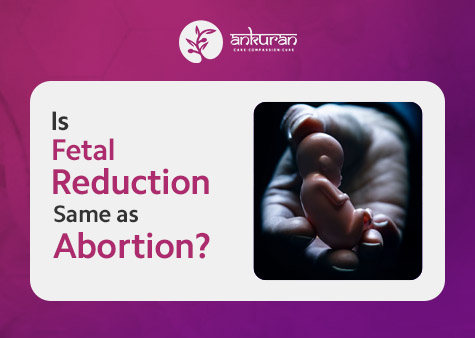Fetal Reduction vs Abortion – Are They the Same?
Many people confuse fetal reduction with abortion, but these two medical procedures serve very different purposes. While abortion results in ending the entire pregnancy, fetal reduction focuses on decreasing the number of fetuses in cases of multifetal pregnancy to support better birth outcomes. Understanding the distinction is important for families facing complex pregnancy decisions.
What is Fetal Reduction?
Meaning & Medical Purpose
Fetal reduction is a specialized medical procedure used to reduce the number of fetuses in a pregnancy, usually when more than two are present. The main purpose is to lower pregnancy risks for both the mother and the remaining fetus(es). In cases of multifetal reduction, the goal is to improve survival chances, reduce complications, and support better outcomes.
Elective vs Selective Fetal Reduction
There are two types:
- Elective fetal reduction: When parents and doctors decide to reduce the number of fetuses for medical or lifestyle reasons.
- Selective fetal reduction: When one fetus has severe abnormalities or health issues, making reduction necessary to safeguard the mother or other fetuses.
Both types require careful medical evaluation, and the risk of miscarriage after selective reduction is a critical factor doctors always consider.
What is Abortion?
Types of Abortion (Medical vs Surgical)
Abortion refers to ending a pregnancy. It can be done through:
- Medical abortion: Using prescribed medication to terminate the pregnancy.
- Surgical abortion: A minor surgical procedure to remove pregnancy tissue.
Key Differences from Fetal Reduction
Unlike fetal reduction, abortion does not aim to preserve the pregnancy. Abortion ends the entire pregnancy, while fetal reduction procedures are carried out to support the continuation of a healthier pregnancy.
Who Needs Fetal Reduction?
Qualifications & Medical Indications
Fetal reduction is generally recommended in cases of high-risk pregnancies, such as:
- Pregnancies with triplets, quadruplets, or more.
- Increased risk to the mother’s health due to multiple fetuses.
- Cases where one fetus shows significant anomalies.
Multifetal Reduction Explained
Multifetal reduction is often performed to reduce a high-order pregnancy to twins or a singleton, which significantly improves safety and the chances of successful delivery.
Learn More:
Fetal Reduction Procedure Explained
When is the Best Time for Fetal Reduction?
The ideal time for the fetal reduction procedure is between 11 to 13 weeks of pregnancy. However, families often ask about fetal reduction at 20 weeks, which is rare and only considered under very specific circumstances.
How is Fetal Reduction Done?
The fetal reduction procedure is generally carried out with the help of ultrasound imaging to ensure accuracy and safety. A safe injection is administered to stop the growth of one fetus, while the others continue to develop normally.
Is Fetal Reduction Performed Under Anesthesia?
Most procedures are done under local anesthesia, with sedation if required. The process is quick but requires skilled specialists.
What Happens After the Procedure?
After the procedure, patients are advised to rest, take prescribed medications, and attend regular follow-ups. Emotional counseling may also be provided, as the experience can be emotionally challenging for families.
Safety, Risks & Outcomes
How Safe is Fetal Reduction?
With advanced medical technology, fetal reduction procedures are generally safe. The main goal is to improve maternal health and ensure a successful pregnancy.
Risk of Miscarriage After Selective Reduction
There is a risk of miscarriage after selective reduction, but with experienced doctors, the chances are minimized. Proper monitoring and care play a huge role in preventing complications.
Fetal Reduction Success Rate
The fetal reduction success rate is 99.5-100% encouraging, especially when performed in specialized fertility centers. The majority of mothers go on to deliver healthy babies.
What Happens to the Fetus After Selective Reduction?
The reduced fetus is reabsorbed by the mother’s body naturally, without affecting the growth of the surviving fetus(es).
Practical Considerations for Families
Fetal Reduction at 20 Weeks – Is It Possible?
Fetal reduction at 20 weeks is rarely recommended and only considered in emergency situations, such as severe fetal abnormalities or maternal health risks.
What is the Cost of Fetal Reduction in India?
The cost of fetal reduction in India can vary depending on the city, hospital, and medical complexity. On average, it ranges between ₹50,000 – ₹1,50,000.
Is Fetal Reduction Covered by Insurance?
In most cases, fetal reduction is not covered under standard insurance policies. Families should check with their provider for specific coverage details.
Fetal Reduction vs Abortion: Key Differences (Comparison Table)
| Aspect | Fetal Reduction | Abortion |
| Purpose | Reduces number of fetuses in a multifetal pregnancy | Ends the entire pregnancy |
| Timing | Usually done between 11–13 weeks | Can be performed within a wider timeframe |
| Procedure | Ultrasound-guided reduction | Medical or surgical termination |
| Risks | Small risk of miscarriage after selective reduction | Risks of bleeding, infection, incomplete abortion |
| Emotional/Ethical Aspects | Preserves pregnancy, focuses on safety | Ends pregnancy completely |
Conclusion
While fetal reduction and abortion are often confused, they are very different procedures. Fetal reduction aims to preserve the pregnancy and protect maternal and fetal health, whereas abortion ends the pregnancy altogether.
If you or your loved one is considering selective fetal reduction, always seek professional medical advice. Specialists can explain the fetal reduction procedure, potential risks, and fetal reduction success rate based on your unique situation. Consult a fertility specialist today to understand if fetal reduction is the right choice for your case. At Ankuran IVF Clinic, we understand that decisions like multifetal reduction are never easy. Our team of compassionate doctors combines advanced technology with personalized care to ensure the highest safety standards and emotional support throughout the journey. With expertise in handling delicate cases, Ankuran has helped many families achieve successful pregnancies with confidence and care.
- What Exactly Does MCDA Mean in Twins? Diagnosis Guide for Parent’s
- Fetus Ultrasound Scan Shows Ventriculomegaly — What Does It Mean?
- Cervical Cerclage: Is It Major Surgery, When It’s Done and What Happens
- What Is Sperm DNA Fragmentation and Why Does It Matter
- Painless Normal Delivery: What It Is and How an Epidural Makes Birth Comfortable



No Comments